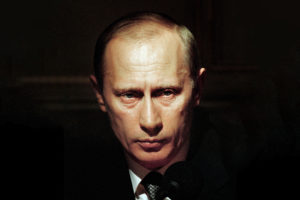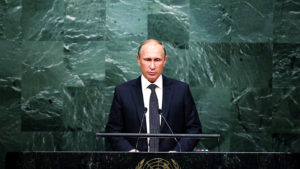Vladimir Putin came to the world’s notice, in 2000, styled as a New Russian Democrat. He had been an aide to the charismatic Petersburg reformist mayor, Anatoly Sobchak. His assumption of the supreme political office of president — after a rapid series of promotions — was blessed by the retiring Boris Yeltsin, an idiosyncratic ruler, often absent from duty but never backing down from his decision to finish with communism and look west for models of governance.
Putin’s first, modest speeches were shaped for Western applause. He suggested Russia might join Nato. He embraced the freedoms of the media and speech. He gave a book length interview where he revealed that he had, under his mother’s influence from 1993, embraced Orthodox Christianity. In his first inauguration speech, in May 2000, he said, “the path to a free society was not simple and easy: in our history there have been tragic and bright pages. The construction of a democratic state is far from complete, but much has already been done.”
The façade which he and his aides had constructed during these first months soon crumbled. The rackety, already corrupt and incomplete democracy Putin inherited has, in the 22 years since that speech, been undone. Among the most shocking, tragic acts of undoing came last month, a little before Christmas: the central offices of Memorial, a human rights group, were closed.
Memorial was founded, in the dying years of the Soviet Union, by Andrei Sakharov, the nuclear scientist and human rights activist and the historian Arseny Roginsky. Sakharov had been released from internal exile by Mikhail Gorbachev; Roginsky was once imprisoned for publishing a document named “Memory” — a doomed effort to hold the mass incarcerations of the Stalinist period to account. Memorial took on Roginsky’s lone work. It had research offices in the main camp zones. It was backed by large support from abroad and researchers devoted to often savage discoveries. Memorial would diligently publicise their findings.
While a reporter in Moscow, I flew, in the early winter of 1992, to Vorkuta in the Arctic Circle to report on the campaign for the coming parliamentary elections of Yegor Gaidar, the prime minister. Vorkuta had been built in the early Thirties to be the administrative hub for a network of camps, whose prisoners dug coal from anthracite mines. Gaidar had been booked to give a speech in the town’s cultural centre. The town council organised a good show by local dancers, musicians, actors and singers. When the small, tubby prime minister came on stage, he was given a cheer — a reception which soured quickly. Gaidar, a brave and principled man, spoke of the town’s past as a centre for oppression. Scattered at first, then louder, came the hisses and boos. When Gaidar left, I struggled to get near him because of the crush of people angrily mobbing him, his security detail ploughing their way through.
It was the first time I had seen how much the invoking of the past as a horror struck people as an insult. These citizens — who had a tough life in that freezing city, which is now rapidly becoming a ghost town — wanted a sense that they and their parents and grandparents, who had staffed the city-prison, had honour. Gaidar was impugning it.
By closing Memorial, Putin will, for a substantial number of Russians, gain rather than lose points, as he and his advisors must have calculated. Yet does this mean — as many commentators, Russian and foreign, now believe — that the suppression of an institute dedicated to exhuming the truth foreshadows a descent into a state comparable to Nazism, or Stalinism in the Thirties?
I do not believe so.
Hitler and Stalin advertised themselves, from the beginning, as tyrants. Tyrants in a noble cause, they believed. Tyrants of necessity, who would lead their people though sacrifice into societies of freedom and plenty, underpinned by ideologies and force which removed enemies. Putin came in as an awkward democrat and progressed, by degrees, into a fitful authoritarian, finding his mission not before but as he ruled — a mission to reconstitute as much of the lost Soviet Union as was possible. And among many — though they tend to be the older generations — that’s a fine ambition. Not for so many of the young.
Putin isn’t popular with the rising generation. Polls by the Levada Institute in February and October last year show that nearly half of 18-24 year olds disapprove of the President’s performance, and only one third wish him to be re-elected. An essay by the commentator Andrei Kolesnikov last month, based on polls by the Carnegie Institute, detailed a strong aversion to a war with Ukraine, and a positive view of the country by two thirds of the 18-24 year olds. Putin doesn’t have the force, the ideology or, likely, the stomach for mass repression, once wide-scale protests begin over a bloody war with the nearest neighbour.
This isn’t the Thirties. Then, throughout the industrialised world, the globalisation of the early 20th century had failed. Depression ruled. Now globalisation is unavoidable. Russia is ill-equipped to benefit properly from it, since its feeble attempts at industrial modernisation have yielded little. But it is energy rich: it is crucial to keeping much of Europe, especially Germany, supplied with light and heat. Its elite, many of the members corruptly enriched by the Putin presidency, wish to be able to spend their money in Europe, North America and the Caribbean. When Stalin was dictator he possessed an ideology that could be used to excuse the hideous consequences of his rule. Putin’s corruption, dependent on international cooperation from tax havens and the City of London, is more limited in scale.
Russia’s ever-closer relations with China also impose limits on Putin. In Stalin’s day, the Soviet Union was the inspiring model, the “big brother”, for Mao Tse Tung; now China has assumed the big brother role. The CCP, learning from the sight of Gorbachev giving the basis of communism away, has kept its ability to inspire fear, identify and suppress its enemies — presently, the Uighurs. Nevertheless, even more than for Russia, globalisation is the lifeblood of communism with Chinese characteristics. China seeks to acquire at least equal status with the United States, but not to destroy it, whether through ideology or war. It, too, has limits, and will enforce them on little brother.
What options for containment are available to the West, beyond registering revulsion at the closure of a great institution such as Memorial? The looming possibility of an invasion of Ukraine sharpens the question.
The answer is mostly obvious. It is to recognise the nature of the Russian (and Chinese) regimes, dedicated to covert subversion in Western states — and to strengthen democracies against them. In part this is military, where the US remains unparalleled and where Nato leaders last week, according to the New York Times’ Steven Erlanger, “spoke, in talks with the Russians, with exceptional unity for a 30-member alliance whose commitment to collective defence was increasingly in question”. Erlanger quoted Anna Wieslander, chair of Sweden’s Institute for Security and Development, as saying that “Deterring Russia is in the DNA of Nato because Russia is what can bring existential threats to European nations”. Sweden, like Finland, is not a Nato member, but both the Swedish Prime Minister Magdalena Andersson and the Finnish Premier Sauli Niinistö have recently indicated that they might now argue for membership. Putin’s threats have caused Nato’s popularity to surge — not, presumably, what he wished for.
As important as military strength is the renewal of our ideology, which is based on freedom, and depends on states with democratic politics which foster civil society. The Democracy Summit, hosted by President Joe Biden in December, was encouraging: as was his earlier recognition that democracy “doesn’t happen by accident: we have to defend it, fight for it, strengthen it, renew it”. Renewing it, above all, by elevating the fight against corruption to being a constant theme in politics and in the media. Without this struggle, Western societies, where the majority of people are just getting by, will continue to fragment. Civic life in a democracy must be exemplary. Democracy and freedom certainly don’t happen by accident — and they aren’t sustained by being taken for granted.
Putin’s Russia warns of what happens when corruption goes unchecked. Memorial was dedicated to revealing the tragedies of history, and for that Putin’s government considered it a threat and an outrage. The state’s prosecutor charged them with being “traitors to the motherland and Nazi collaborators” — a grimly ironic reversion to the Stalinist language of the past. Such lies can only be the product of fragility, and fear. The Russian government knows that a generation is growing full of men and women intolerant of a state fashioned to make authoritarian leaders rich, and history what Vladimir Putin says it is.
Disclaimer
Some of the posts we share are controversial and we do not necessarily agree with them in the whole extend. Sometimes we agree with the content or part of it but we do not agree with the narration or language. Nevertheless we find them somehow interesting, valuable and/or informative or we share them, because we strongly believe in freedom of speech, free press and journalism. We strongly encourage you to have a critical approach to all the content, do your own research and analysis to build your own opinion.
We would be glad to have your feedback.
Source: UnHerd Read the original article here: https://unherd.com



